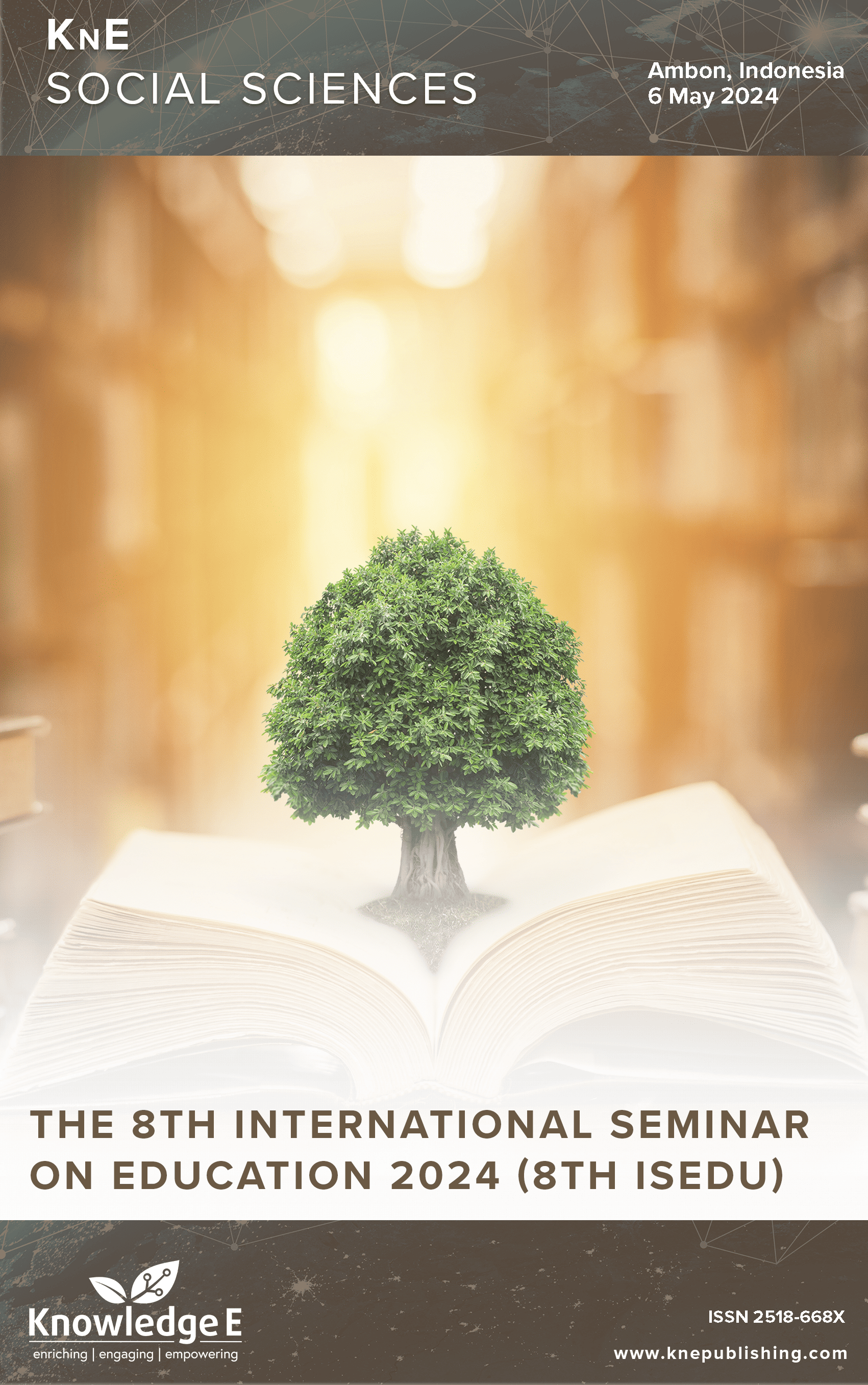The Challenges of the Kurikulum Merdeka Implementation in 3T Area
DOI:
https://doi.org/10.18502/kss.v9i31.17598Abstract
This study investigates the challenges of implementing the Kurikulum Merdeka in the disadvantaged, remote, and outermost (3T) areas of Maluku. The significance of this research lies in addressing the geographic, infrastructural, and educational accessibility issues in these 3T areas, which can hinder the effective implementation of the Curriculum. The research employs a descriptive qualitative methodology. The study engaged 40 respondents, including school principals, teachers from both public and private schools, training facilitators, and assistant program implementers. Data were collected through questionnaires and interviews and were then analyzed to identify recurring patterns, problems, challenges, and obstacles faced during implementation. The results indicate that despite their dedication to implementing the curriculum, nearly all schools struggle with the execution of the Kurikulum Merdeka. The main challenge identified is the inadequacy of teachers in designing and carrying out learning activities as required by the curriculum. This issue arises from various factors, including limited access to technology, insufficient training for principals and teachers, shortcomings in the mentoring mechanisms, and a lack of digital literacy among educators. Consequently, the government's mandate to implement this curriculum in all schools should be preceded by comprehensive preparation. Emphasis should be placed on enhancing teachers' capabilities through training sessions and workshops focused on planning, executing, and evaluating learning activities. Additionally, providing sufficient facilities and fostering a supportive learning environment are essential aspects that must be addressed.
Keywords: implementation, Kurikulum Merdeka, disadvantaged, remote area
References
Alfath MD, Huliatunisa Y. ANALISIS KEBIJAKAN SERTIFIKASI TERHADAP KINERJA GURU. Indonesian J Element Educ. 2020;2(1): Available from:http://jurnal.umt.ac.id/index.php/IJOEE DOI: https://doi.org/10.31000/ijoee.v2i1.3900
Arifin M, Chaniago ES, Ekayati R. Profiling Junior High School Students with Pancasila Values through life skill-based literacy. Int J Soc Manage Stud (IJOSMAS), 2023;4(2).
Baharuddin MR. Adaptasi Kurikulum Merdeka Belajar Kampus Merdeka (Fokus: Model MBKM Program Studi). Jurnal Studi Guru Dan Pembelajaran. 2021;4(1):195– 205. DOI: https://doi.org/10.30605/jsgp.4.1.2021.591
Dewi U, Sumarno A, Susarno LH. PEMBELAJARAN DARING UNTUK MENDUKUNG IMPLEMENTASI MERDEKA BELAJAR KAMPUS MERDEKA (MBKM) [MBKM]. Online Learning to Support The Implementation of Merdeka Belajar Kampus Merdeka. 2022 Aug;10(1):1. DOI: https://doi.org/10.31800/jtp.kw.v10n1.p1--14
Evi Hasim. Penerapan Kurikulum Merdeka Belajar Perguruan Tinggi Di Masa Pandemi Covid-19. Prosiding Webinar Magister Pendidikan Dasar Pascasarjana Universitas Negeri Gorontalo “Pengembangan Profesionalisme Guru Melalui Penulisan Karya Ilmiah Menuju Anak Merdeka Belajar.” 2020;68–74.
Febrianto PT, Maureen IY, Bachri BS. Evaluation of MBKM Program Implementation in Elementary Schools. Jurnal Pamator : Jurnal Ilmiah Universitas Trunojoyo. 2023;16(3):509–26. DOI: https://doi.org/10.21107/pamator.v16i3.20278
Hidayat DR, Rohaya A, Nadine F, Ramadhan H. KEMANDIRIAN BELAJAR PESERTA DIDIK DALAM PEMBELAJARAN DARING PADA MASA PANDEMI COVID -19. Perspektif Ilmu Pendidikan. 2020;34(2):147–54. DOI: https://doi.org/10.21009/PIP.342.9
Hocking C, Thomas L, Ottaway J, Jones R. Independent learning – what we do when you’re not there. Teach High Educ. 2017;23(2):1–17. DOI: https://doi.org/10.1080/13562517.2017.1332031
Indarta Y, Jalinus N, Waskito W, Samala AD, Riyanda AR, Adi NH. Relevansi kurikulum merdeka belajar dengan model pembelajaran abad 21 dalam perkembangan era society 5.0. Edukatif: Jurnal Ilmu Pendidikan, 2022;4(2):3011–3024. https://doi.org/https://doi.org/10.31004/edukatif.v4i2.2589 DOI: https://doi.org/10.31004/edukatif.v4i2.2589
Irawan H, Masyitoh IS, Sundawa D. Concept and application of character education in the profil Pelajar Pancasila as an effort to strengthen character in the era of disruption. Proceeding of International Conference on Innovations in Social Sciences Education and Engineering. 2023;3:15.
Jones WM, Dexter S. How teachers learn: The roles of formal, informal, and independent learning. Educ Technol Res Dev. 2014;62(3):367–84. [cited 2024 May 14] Available from: https://www.learntechlib.org/p/153779/ DOI: https://doi.org/10.1007/s11423-014-9337-6
Kamalia P, Andriansyah E. Independent learning-independent Campus (MBKM) in students’ perception. Jurnal Kependidikan: Jurnal Hasil Penelitian dan KajianKepustakaan di Bidang Pendidikan, Pengajaran dan Pembelajaran. 2021;7(4):857- 867. https://doi.org/10.33394/jk.v7i4.4031. DOI: https://doi.org/10.33394/jk.v7i4.4031
Kempa R, Serpara H, Lokollo L. The role of the German teachers’ community as a pioneer in improving teacher competence [EduLearn]. J Educ Learn. 2023;17(3):408– 16. Available from: https://doi.org/https://doi.org/10.11591/edulearn.v17i3.20725 DOI: https://doi.org/10.11591/edulearn.v17i3.20725
Kepmendikbudristek Nomor 262 Tahun 2022 Tentang Perubahan Perndeikbud Nomor 22 Tahun 2022. Tentang Perubahan Atas Keputusan Menteri Pendidikan, Kebudayaan, Riset, Dan Teknologi Nomor 56/M/2022 Tentang Pedoman Penerapan Kurikulum Dalam Rangka Pemulihan Pembelajaran.
Kopzhassarovaa U, et al. Enhancement of students’ independent learning through their critical thinking skills development. Int J Environ Sci Educ. 2016;11(18):11585– 11585.
Manalu JB, Sitohang P, Henrika NH. Pengembangan perangkat pembelajaran kurikulum merdeka belajar. Prosiding Pendidikan Dasar. 2022;1(1):80–86. https://doi.org/https://doi.org/10.34007/ppd.v1i1.174
Marisa M. Curriculum innovation “independent learning” in the era of society 5.0. Santhet: jurnal Sejarah. Pendidikan Dan Humaniora. 2020;4:13.
Matdoan MN, et al. Profil Pendidikan Provinsi Maluku Dalam perspektif Merdeka Belajar. Tim Penerbit BPMP Provinsi Maluku; 2023.
Milles MB, Huberman AM. Analisis data kualitatif: buku sumber tentang metodemetode baru. Jakarta: UIP; 1992.
Pertiwi AD, Nurfatimah SA, Hasna S. Menerapkan metode pembelajaran berorientasi student centered menuju masa transisi kurikulum merdeka. Jurnal Pendidikan Tambusai. 2022;6(2):8839–8848. https://doi.org/https://doi.org/10.31004/jptam.v6i2.3780
Rahayu R, Rosita R, Rahayuningsih YS, Hernawan AH, Prihantini P. Implementasi Kurikulum Merdeka Belajar di Sekolah Penggerak. Jurnal Basicedu. 2022;6(4):6313– 9. DOI: https://doi.org/10.31004/basicedu.v6i4.3237
Retraubun Alex, Berpihakkah Kita Kepada Kepulauan, dalam Rubrik Humaniora. Kompas Online, http:/wwwkompas.com/kompascetak0508/ 15/humaniora/1975223.html
Sherly S, Dharma E, Sihombing HB. Merdeka belajar: kajian literatur. Urban Green Conference Proceeding Library. 2020;183–190.
Sugiyono. (2020). Metode Penelitian Kuantitatif, Kualitatif dan R&D. Bandung: Alfabeta.
Tamboto H, Tambingon HN, Lengkong JS, Rotty VN. The involvement of students’ parents in organizing the learning from home at Elementary Schools in Tomohon City. Asia Pacific J Manage Educ (APJME), 2021;4(1):5–51. https://doi.org/https://doi.org/10.32535/apjme.v4i1.1044 DOI: https://doi.org/10.32535/apjme.v4i1.1044
Tomasouw J, Marantika JE. (2021). The effect of using the think pair share learning model to enhance the capability of comprehending the German Text. J-EDu: Journal-Erfolgreicher Deutschunterricht. 2021;1(1):12–16. https://doi.org/https://doi.org/10.30598/J-EDu.1.1.12-16 DOI: https://doi.org/10.30598/J-EDu.1.1.12-16
Tomlinson CA, Jarvis JM. Differentiation: Making curriculum work for all students through responsive planning & instruction. In Systems and models for developing programs for the gifted and talented (pp. 599–628). Routledge, 2023. DOI: https://doi.org/10.4324/9781003419426-22
Warsihna J, Ramdani Z, Amri A, Kembara MD, Steviano I, Anas Z, et al. Tantangan dan Strategi Implementasi Kurikulum Merdeka pada Jenjang SD: Sebuah Temuan Multi-Perspektif. Kwangsan: Jurnal Teknologi Pendidikan. 2023;11(01):296- 311. https://doi.org/10.31800/jtp.kw.v11n1.p296–311 DOI: https://doi.org/10.31800/jtp.kw.v11n1.p296--311
Zulaiha S, Meisin M, Meldina T. Problematika Guru dalam Menerapkan Kurikulum Merdeka Belajar. Terampil: Jurnal Pendidikan Dan Pembelajaran Dasar. 2022;9(2):163–177. https://doi.org/http://dx.doi.org/10.24042/terampil.v9i2.13974 DOI: https://doi.org/10.24042/terampil.v9i2.13974

